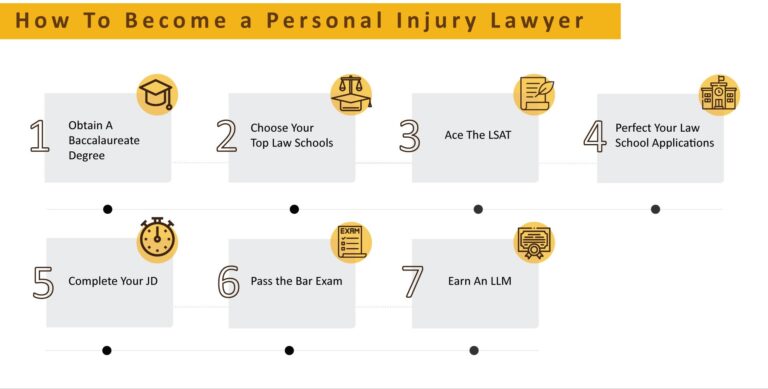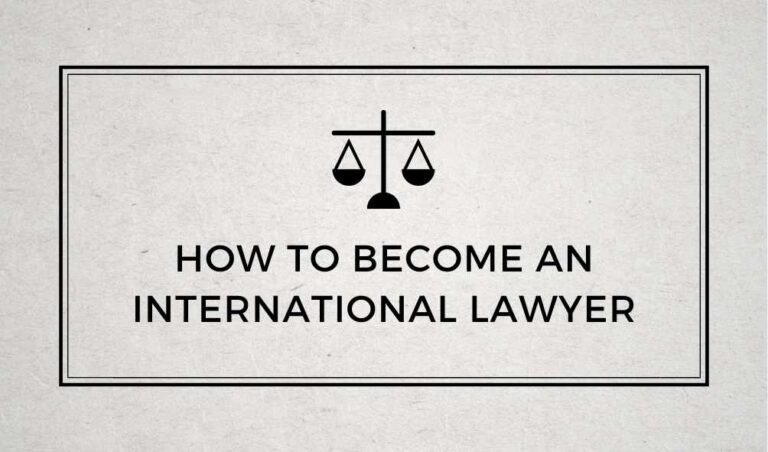How to Become a Constitutional Lawyer?

To become a constitutional lawyer, earn a law degree and specialize in constitutional law. Develop strong research, writing, and analytical skills, and gain practical experience through internships or clerkships with courts or law firms.
Table of Contents
Becoming a constitutional lawyer is a rewarding and intellectually stimulating career path for those passionate about upholding the principles and values embedded in a nation’s constitution. Constitutional lawyers play a crucial role in shaping legal interpretation, defending civil liberties, and safeguarding the constitutional rights of individuals and organizations.
Pursuing this field requires dedication, extensive education, and a deep understanding of constitutional law. By following a structured path, aspiring constitutional lawyers can embark them to make a significant impact on society and contribute to the legal framework of their country. From earning a law degree to honing research and writing skills, this article outlines the steps of How to Become a Constitutional Lawyer.

What Is A Constitutional Lawyer?
A constitutional lawyer, also known as a constitutional law attorney, is a legal professional who specializes in the field of constitutional law. This branch of law relates to the interpretation and application of a country’s constitution, which sets out the fundamental principles and rules by which it is governed. Constitutional lawyers work with constitutional issues and cases, ensuring that the rights and freedoms enshrined in the constitution are protected and upheld.
Roles And Responsibilities
Constitutional lawyers play a vital role in safeguarding the constitution and ensuring that it remains the supreme law of the land. Their roles and responsibilities encompass a range of legal tasks and obligations:
- Interpreting the Constitution: Constitutional lawyers are experts in analyzing and interpreting the language used in the constitution. They examine its provisions and apply them to real-life situations and legal disputes.
- Advising on legal matters: Constitutional lawyers provide legal counsel and advice to individuals, organizations, and government bodies on constitutional matters. Their insights help guide decision-making processes and ensure compliance with the constitution.
- Representing clients: Constitutional lawyers represent clients, including individuals, groups, or institutions, in constitutional cases. They present arguments and defend their clients’ rights before courts and other legal forums.
- Challenging laws: When laws or practices are believed to be unconstitutional, constitutional lawyers can challenge their validity. They take legal action, seeking to have these laws or practices declared inconsistent with the constitution and, therefore, unenforceable.
- Advocating for change: Constitutional lawyers may also engage in advocacy work, lobbying for amendments to the constitution, or advocating for constitutional reform to align with changing societal needs or values.
Importance In Legal System
The role of constitutional lawyers is fundamental to the functioning of a country’s legal system. Here’s why they are crucial:
- Preserving democratic principles: Constitutional lawyers protect and defend democratic principles enshrined in the Constitution. They ensure that the powers of the government are limited, and individual rights and liberties are upheld.
- Safeguarding the rule of law: As guardians of the constitution, constitutional lawyers play a crucial role in upholding the rule of law. They ensure that laws and actions by public officials adhere to constitutional standards, preventing abuse of power.
- Promoting justice and equality: Constitutional lawyers strive for justice and equality by challenging discriminatory laws and advocating for the rights of marginalized communities. Their work helps promote a fair and inclusive society.
- Resolving constitutional conflicts: When conflicts arise regarding the interpretation of the constitution or the division of powers between different branches of government, constitutional lawyers help resolve these disputes through litigation or negotiation.
In conclusion, constitutional lawyers have pivotal roles and responsibilities in interpreting, defending, and advocating for the constitution. They are crucial in preserving the democratic values and upholding the rule of law in a country’s legal system.

Educational Requirements
Becoming a constitutional lawyer requires a solid educational foundation. It’s crucial to understand the educational requirements involved in pursuing this prestigious career path. Here’s what you need to know:
Bachelor’s Degree
A bachelor’s degree is the first step towards becoming a constitutional lawyer. Typically, aspiring lawyers pursue a four-year undergraduate program in a related field such as political science, history, or pre-law. This provides a solid foundation in subjects that are central to constitutional law.
Law School
After completing your bachelor’s degree, the next step is attending law school. Admission to law school requires a strong undergraduate GPA, a competitive score on the Law School Admission Test (LSAT), letters of recommendation, and a well-written personal statement.
Law school is an intensive three-year program where students delve deeper into various aspects of law, including constitutional law. During this time, students gain essential skills and knowledge to succeed in the legal profession.
Specialization In Constitutional Law
While attending law school, you have the opportunity to specialize in constitutional law. This specialization allows you to focus your studies specifically on the principles, doctrines, and cases that shape and interpret the Constitution.
By taking constitutional law courses, participating in moot court or law journal activities, and completing internships or externships with constitutional law practitioners, you can gain invaluable practical experience and build a strong network in the field.
Obtaining a top-notch education and specializing in constitutional law paves the way to becoming a successful constitutional lawyer. Remember, hard work, dedication, and continuous learning are essential to thriving in this highly respected and intellectually stimulating legal profession.
Gaining Experience
Becoming a constitutional lawyer requires gaining experience through specialized education and practical training in constitutional law. This includes obtaining a law degree, engaging in internships or clerkships, and building a strong knowledge base of constitutional principles and case law.
Internships And Clerkships
A great way to gain experience as a future constitutional lawyer is through internships and clerkships. These opportunities allow you to work alongside experienced professionals in the field and get hands-on experience with the legal process. Internships and clerkships provide valuable exposure to the day-to-day workings of a law firm or government organization, and they can also provide networking opportunities that may lead to future job opportunities.
When considering internships and clerkships, it’s important to prioritize those that focus on constitutional law. Look for positions within law firms, government agencies, or advocacy organizations that specialize in constitutional law. These organizations will provide you with the most relevant experience and allow you to work on cases and issues directly related to the Constitution.
During your internship or clerkship, you may have the opportunity to assist with legal research, draft legal documents, attend court proceedings, and work directly with attorneys on constitutional law cases. This hands-on experience will deepen your understanding of constitutional law and help you build the skills necessary for a successful career in the field.
Working With Non-profit Organizations
In addition to internships and clerkships, working with non-profit organizations is another way to gain experience as a constitutional lawyer. Non-profit organizations often specialize in advocacy work and may focus on specific constitutional issues, such as civil rights or freedom of speech.
Look for non-profit organizations that align with your specific interests in constitutional law. For example, if you are passionate about criminal justice reform, you may consider volunteering or working with an organization that focuses on prisoners’ rights or ending mass incarceration. By working with non-profit organizations, you can gain practical experience in constitutional law while making a positive impact on the issues you care about.
When working with non-profit organizations, take advantage of opportunities to attend conferences, seminars, and workshops related to constitutional law. These events allow you to stay updated on current trends and developments in the field while expanding your professional network. Additionally, volunteering your time and expertise can lead to potential job opportunities or collaborations with other legal professionals and organizations.

Building Skills
Building skills is an essential step in becoming a successful constitutional lawyer. This profession requires a diverse range of abilities that are crucial for navigating the complexities of constitutional law. By honing specific skills, aspiring constitutional lawyers can develop a solid foundation to excel in their careers. In this section, we will explore the key skills necessary for aspiring constitutional lawyers: research and analytical skills, oral and written communication skills, and critical thinking and problem-solving.
Research And Analytical Skills
Research and analytical skills lie at the heart of constitutional law. As a constitutional lawyer, you must possess the ability to thoroughly investigate legal cases, statutes, regulations, and legal precedents. Effective research techniques help you uncover relevant information and gain a deep understanding of constitutional principles and rights, enabling you to craft strong legal arguments.
Moreover, strong analytical skills are paramount in interpreting complex legal documents, identifying legal issues, and assessing their implications. You must be adept at analyzing the language and structure of the Constitution, legislative acts, and court decisions. This ability allows you to identify potential loopholes, conflicts, or ambiguities that may arise in constitutional law.
Oral And Written Communication Skills
Oral and written communication are fundamental skills that every constitutional lawyer should possess. As a constitutional lawyer, you must effectively articulate complex legal arguments, both orally and in writing, to various audiences such as judges, clients, and colleagues.
Your oral communication skills should enable you to present compelling arguments in courtrooms or during negotiations. It is important to deliver your arguments clearly, persuasively, and confidently, as it can greatly impact the outcome of a case.
Equally important are your written communication skills. The ability to draft persuasive legal documents, including briefs, memos, and motions, is crucial. Your writing should demonstrate logical reasoning, clarity, precision, and a thorough understanding of constitutional and legal concepts.
Critical Thinking And Problem Solving
Critical thinking and problem-solving are at the core of a successful constitutional lawyer’s skill set. In this field, you will encounter intricate legal issues and challenges that require thoughtful analysis and creative solutions.
Your critical thinking skills should allow you to synthesize complex information, assess different perspectives, and evaluate the strengths and weaknesses of various legal arguments. By leveraging your critical thinking abilities, you will be able to identify innovative strategies and approaches to tackle constitutional issues.
Problem-solving skills are vital when addressing constitutional law challenges. This involves applying legal principles and knowledge to unique situations or disputes. You must be able to assess the impact of your course of action and consider potential ramifications.
In conclusion, building skills is an integral part of becoming a successful constitutional lawyer. Enhancing your research and analytical skills, oral and written communication abilities, as well as critical thinking and problem-solving expertise, empowers you to navigate the intricacies of constitutional law effectively. By devoting time and effort to develop these skills, you lay the foundation for a rewarding career in constitutional law.
Networking And Professional Development
Networking and professional development are crucial components of becoming a successful constitutional lawyer. By actively participating in professional associations, attending conferences and seminars, and seeking mentorship and networking opportunities, you can build a strong foundation for your career in constitutional law.
Joining Professional Associations
Joining professional associations is an excellent way to connect with like-minded individuals in the legal field. These organizations, such as the American Bar Association (ABA) and the Federal Bar Association (FBA), offer valuable networking opportunities and resources for aspiring constitutional lawyers.
By becoming a member of these associations, you gain access to conferences, workshops, and networking events specifically designed for legal professionals. Additionally, you can stay up-to-date with the latest developments and trends in constitutional law by engaging with fellow members and participating in online forums and discussions.
Attending Conferences And Seminars
Attending conferences and seminars is an effective way to expand your knowledge, learn from industry experts, and establish professional connections. Look for events that focus on constitutional law, such as the American Constitution Society (ACS) National Convention and the National Constitution Center symposiums.
These gatherings provide opportunities to hear from renowned constitutional scholars, judges, and practicing lawyers. By actively participating in panel discussions and networking breaks, you can build relationships with individuals who share your passion for constitutional law, potentially leading to future collaborations or job opportunities.
Mentorship And Networking Opportunities
Seeking mentorship and networking opportunities can greatly contribute to your growth as a constitutional lawyer. Mentors, who are experienced legal professionals, can offer guidance, share insights, and help you navigate the complexities of the field.
Attend professional networking events hosted by your law school, local bar associations, or legal organizations. These events often feature guest speakers, panel discussions, and informal networking sessions, allowing you to connect with practicing constitutional lawyers.
Building a strong professional network can open doors to internships, clerkships, and even job placements. Remember to maintain these connections by following up with individuals you meet, engaging in meaningful conversations, and offering your assistance whenever possible.
Conclusion
In becoming a constitutional lawyer, it is crucial to cultivate a strong foundation in law, develop excellent research and analytical skills, and strive for continuous learning. By immersing oneself in the study of constitutional law, seeking internships or clerkships, and networking with professionals in the field, aspiring lawyers can pave the way for a successful career.
Remember, dedication, perseverance, and a genuine passion for justice are key ingredients to becoming a proficient constitutional lawyer. Your hard work and commitment will undoubtedly pay off as you navigate through this rewarding profession.
Introducing Jonah Plum, a legal luminary whose journey through the corridors of justice has been intertwined with the eloquence of the written word. Born and raised in the vibrant city of Seattle, Washington, Jonah's early fascination with language and debate laid the foundation for a remarkable career in law.
Jonah's scholarly odyssey began at Harvard Law School, where they immersed themselves in the study of jurisprudence, honing their analytical prowess and legal acumen. Armed with a law degree, they entered the legal arena, navigating courtrooms and boardrooms with a fervor for justice. Yet, it was the realization of the transformative power of the written word that led Jonah to pivot from legal briefs to the world of blogging.
A digital advocate in the truest sense, Jonah recognized the need for demystifying legal concepts and making them accessible to a broader audience. This blog, a virtual repository of legal insights, transcends geographical boundaries, connecting with a global readership hungry for clarity amidst legal complexities.
Beyond the black letter of the law, Jonah delves into the human stories that underscore the legal landscape. Their writing goes beyond legal analysis, weaving narratives that humanize the law, shedding light on its impact on individuals and society.






